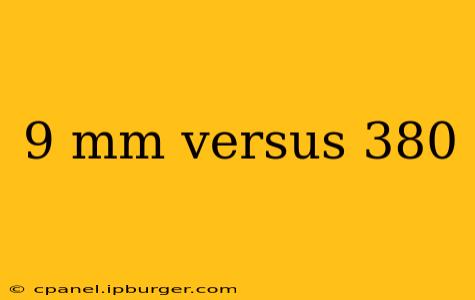9mm vs .380 ACP: Which Caliber Reigns Supreme?
Choosing the right caliber for self-defense or personal protection is a crucial decision. Two popular contenders often top the list: the 9mm Parabellum and the .380 ACP (Automatic Colt Pistol). Both are relatively common, readily available, and manageable for many shooters. However, significant differences exist that can impact your choice. This comprehensive comparison will help you understand the nuances of 9mm vs .380 ACP to make an informed decision.
Understanding the Ballistics: Power and Penetration
The most significant difference between 9mm and .380 ACP lies in their ballistic performance. The 9mm boasts considerably more stopping power. It fires a larger, heavier projectile at a higher velocity, resulting in greater kinetic energy upon impact. This translates to better penetration and a higher likelihood of incapacitating a threat.
The .380 ACP, while suitable for self-defense, offers significantly less stopping power. Its smaller bullet and lower velocity mean less penetration and a potentially reduced chance of instantly neutralizing a threat. This doesn't mean it's ineffective, but it requires more precise shot placement to be as effective as the 9mm.
Here's a table summarizing the key ballistic differences:
| Feature | 9mm Parabellum | .380 ACP |
|---|---|---|
| Caliber | 9x19mm | .380 ACP (9x17mm) |
| Bullet Weight | Typically 115-147 grains | Typically 90-95 grains |
| Muzzle Velocity | Typically 1100-1200 fps | Typically 900-1000 fps |
| Energy | Significantly Higher | Significantly Lower |
| Penetration | Greater | Lesser |
Recoil and Shootability: Comfort and Control
The increased power of the 9mm comes with a trade-off: greater recoil. While manageable for most, the sharper recoil can make follow-up shots more challenging, especially for less experienced shooters.
The .380 ACP is known for its mild recoil, making it more comfortable to shoot and easier to control, particularly for smaller-framed individuals or those new to firearms. This gentler recoil can lead to faster target acquisition and more accurate shots, especially in stressful situations.
Concealed Carry Considerations: Size and Weight
Both calibers are frequently used in concealed carry firearms. However, the .380 ACP generally offers smaller and lighter pistols, making them easier to conceal and carry comfortably throughout the day. This is a crucial factor for those prioritizing discretion and ease of carry.
While 9mm pistols are available in compact sizes, they typically are larger and heavier than their .380 ACP counterparts. The weight difference can become significant over extended periods of carry.
Ammunition Availability and Cost: Practical Considerations
Both 9mm and .380 ACP ammunition are widely available, but 9mm is generally more readily available and often cheaper. This is a significant advantage, particularly during periods of high demand or potential shortages.
While .380 ACP ammunition is available, it may be less common in certain regions or may cost slightly more than 9mm.
Conclusion: The Right Choice for You
The "better" caliber ultimately depends on your individual needs and priorities. The 9mm offers superior stopping power and penetration, but with increased recoil. The .380 ACP prioritizes concealability, ease of use, and milder recoil, but sacrifices some stopping power.
Consider your experience level, physical capabilities, intended use (self-defense, target practice), and comfort level with different recoil profiles when making your decision. Consulting with experienced firearm instructors and professionals can provide valuable insights to ensure you make the most informed choice for your personal safety and protection.
